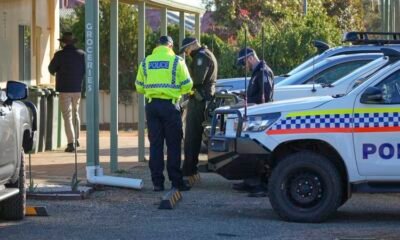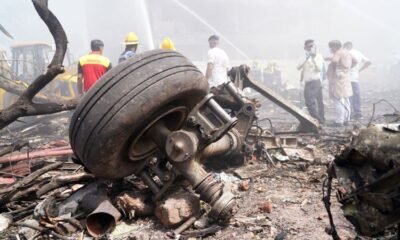Middle East
A simple illustrated guide to zakat, answers to 7 common questions | Religion News

With the fasting month of Ramadan in its final days, many Muslims around the world prepare to fulfil another essential pillar of their faith – giving zakat.
Zakat is a compulsory form of charity in Islam, aimed at supporting the needy and promoting economic equality.
In this visual explainer, we answer seven common questions about zakat to help you understand its purpose, calculations and benefits.
What are zakat and sadaqah?
Zakat is one of the five pillars of Islam, making it a core act of worship. The word zakat means purification or growth and is commanded in the Quran as a means to purify wealth, promote social justice and help those in need.

Zakat is mandatory for Muslims who meet the financial threshold, known as nisab, and is given annually at a fixed percentage of 2.5 (one-40th) of one’s wealth. More on how this is calculated, later.
Sadaqah, on the other hand, is a voluntary charity of any amount that can be given at any time.
Who is required to give zakat?
Zakat is obligatory for adult Muslims whose wealth is above the nisab threshold, the minimum amount needed to be eligible to pay zakat.
The nisab is equivalent to 85gm (3 troy ounces) of gold, or roughly $9,000 based on current market prices.

In addition to the gold standard for determining the nisab amount, there is also a silver standard. The nisab based on silver is equivalent to 595gm (19 troy ounces) of the metal. This accommodates different economic conditions and ensures that zakat is accessible and relevant to a wide range of people.

If a Muslim’s wealth remains above this threshold for a full lunar year, they must pay zakat.
What are the different types of zakat?
There are two main types of zakat: zakat al-mal and zakat al-fitr.
Zakat al-mal, meaning “zakat on wealth”, is the most commonly known form of zakat. It is an obligation requiring Muslims whose wealth exceeds the nisab threshold to donate 2.5 percent of their assets annually.
Zakat al-fitr is a mandatory charitable donation of food before the Eid prayer, marking the end of Ramadan. It is given to help those in need to celebrate Eid. The amount is generally equivalent to the cost of one meal for a person.
What assets are zakatable?
Zakat must be paid on assets and savings, kept to resell or profit from, including:

Zakat is not required on assets in use for daily life, such as:

How is zakat calculated?
The standard zakat rate is 2.5 percent (one-40th) of one’s eligible wealth.
For example, if one’s wealth liable to zakat is $10,000, the due amount is $250 ($10,000 × 2.5% = $250).

Who can one receive zakat?
Zakat is designed to help alleviate poverty and support the less fortunate. So it must be given to Muslims who meet the criteria of need and lack of wealth. The Quran specifies eight categories of people eligible to receive zakat:
The poor – those with little or no income
The needy – those who have some resources but not enough for a stable life
Zakat administrators – individuals or organisations responsible for collecting and distributing zakat
New Muslims – converts or those inclined towards Islam who need financial support
People in debt – those burdened by debts they cannot repay
Stranded travellers – those who lack financial support while away from home
People working in welfare – individuals engaged in religious, educational, or humanitarian efforts
Captives and slaves – historically used to free enslaved people; now applied to modern equivalents like bonded labour
Zakat cannot be given to immediate family members who are considered one’s financial responsibility (like parents, children or spouses). It cannot be given to those who have wealth above the nisab threshold either.
When should zakat be paid?
While many choose to pay zakat during Ramadan for its spiritual rewards, it can be given at any time within a year.
Once a Muslim’s wealth surpasses the nisab threshold, they are required to pay zakat, provided they have had possession of this wealth for a full lunar year (known as hawl).
For example, if someone’s wealth remains above the nisab threshold for an entire year, they are obligated to pay zakat.

However, if wealth drops below the nisab during the year, there is no need to pay zakat.
For example, if someone’s wealth exceeds the nisab for several months but then drops below it before completing a full year, they are not required to pay zakat. Only when their wealth remains above the nisab for a continuous lunar year does the obligation to pay zakat arise.

If someone misses paying zakat in previous years, they must calculate and pay it retroactively.
Zakat can be given directly to those in need or through trusted charities and organisations that distribute it accordingly. While it is encouraged to help those nearby, it can also be given internationally where there is a greater need.
By requiring wealthy individuals to give a portion of their assets, zakat prevents wealth from accumulating in the hands of a few and encourages a more equitable distribution of resources, promoting economic balance and reducing income inequality.
Middle East
Iran’s Khamenei slams US nuclear proposal, vows to keep enriching uranium | Nuclear Energy News

Iranian supreme leader says issue of uranium enrichment remains key to Tehran’s pursuit of energy independence.
Iranian Supreme Leader Ayatollah Ali Khamenei has pledged that Tehran will not abandon its uranium enrichment, rejecting a key demand in a United States proposal aimed at resolving a long-running dispute over Iran’s nuclear programme.
The comments were delivered in a speech on Wednesday as the US and Iran continue to negotiate the details of a possible new nuclear deal. The issue of uranium enrichment has remained a sticking point in the talks, with the US reportedly demanding a complete halt or low-level enrichment in exchange for the lifting of Western sanctions against Tehran.
“The US nuclear proposal contradicts our nation’s belief in self-reliance and the principle of ‘We Can,’” Khamenei said in his speech delivered on the commemoration of the death of the Islamic Republic’s founder, Ayatollah Ruhollah Khomeini, in 1989.
Khamenei said the issue of uranium enrichment remained key to Iran’s pursuit of energy independence.
“Independence means not waiting for the green light from America and the likes of America,” he said, adding that the US proposal was “100 percent against” the ideals of the 1979 Islamic revolution.
He said Tehran would not seek Washington’s approval for its decisions.
“Some people think that rationality means bowing down to America and surrendering to the oppressive power; this is not rationality,” Khamenei said.
“Why are you interfering in whether Iran should have enrichment or not? You cannot have a say.”
On Tuesday, Iranian President Masoud Pezeshkian also said that Tehran “would not abandon” the country’s scientific and nuclear rights, while disavowing nuclear weapons.
He said that those accusing Iran “are proliferating” weapons of mass destruction and destabilising the region with deadly weapons.
On Monday, the Reuters news agency had reported that Tehran was poised to reject the latest US proposal to end a decades-old nuclear dispute, quoting an unnamed diplomat as saying the proposal was a “non-starter” that fails to soften Washington’s stance on uranium enrichment or to address Tehran’s interests.
Tehran said it wants to master nuclear technology for peaceful purposes and has long denied accusations by Western powers that it is seeking to develop nuclear weapons.
US envoy Steve Witkoff, who heads the American delegation in talks with Iran, has said President Donald Trump opposes Tehran continuing any enrichment, calling it a “red line”.
A leaked United Nations report shows that Iran has ramped up production of enriched uranium near weapons-grade by 50 percent in the last three months. It is still short, however, of the roughly 90 percent required for atomic weapons, but still significantly above the 4 percent or so needed for power production.
Iran, however, has rejected the latest report from the International Atomic Energy Agency (IAEA), saying it is “politically motivated and repeates baseless accusations”.
Ira is currently grappling with multiple crises including a plunging currency, losses among regional militia proxies in conflicts with Israel, and rising fears of an Israeli strike on its nuclear sites.
A failure to get a new nuclear deal could see tensions further spike in a Middle East already on edge over Israel’s war in Gaza.
Middle East
Iraq’s Jewish community saves a long-forgotten shrine | Religion News

In a bustling district of Baghdad, workers are labouring diligently to restore the centuries-old shrine of a revered rabbi, seeking to revive the long-faded heritage of Iraq’s Jewish community.
Just a few months ago, the tomb of Rabbi Isaac Gaon was filled with rubbish. Its door was rusted, the windows broken, and the walls blackened by decades of neglect.
Now, marble tiles cover the once-small grave, and at its centre stands a large tombstone inscribed with a verse, the rabbi’s name, and the year of his death: 688. A silver menorah hangs on the wall behind it.
“It was a garbage dump, and we were not allowed to restore it,” said Khalida Elyahu, 62, the head of Iraq’s Jewish community.
Iraq’s Jewish community was once among the largest in the Middle East, but today has dwindled to just a handful of members.
Baghdad now has only one synagogue remaining, but there are no rabbis.
The restoration of the shrine is being funded by the Jewish community, at an estimated cost of $150,000.
The project will bring “a revival for our community, both within and outside Iraq”, Elyahu said.
With the support of Iraqi officials, she expressed hope to restore further neglected sites.
There is little information about Rabbi Isaac. During a visit to the tomb earlier this year, Iraq’s National Security Adviser Qasim al-Araji stated that the rabbi had been a finance official.
Rabbi Isaac was a prominent figure during the Gaonic period, also known as the era of Babylonian academies for rabbis.
The title “Gaon” is likely to refer to his role as the head of one such academy.
His name was cited in the 10th century by another rabbi, who recounted a story that is not known from any other source, according to Professor Simcha Gross of the University of Pennsylvania.
According to the account, Rabbi Isaac led 90,000 Jews to meet Ali ibn Abi Talib, the fourth Islamic caliph and a relative of the Prophet Muhammad, who is revered by Shia Muslims as the first imam, during one of his conquests in central Iraq.
“We have no other evidence for this event, and there are reasons to be sceptical,” Gross noted.
Nothing else is known about Rabbi Isaac, not even his religious views.
According to biblical tradition, Jews arrived in Iraq in 586 BC, taken as prisoners by the Babylonian king, Nebuchadnezzar II, after he destroyed Solomon’s Temple in Jerusalem.
In Iraq, they compiled the Babylonian Talmud.
Thousands of years later, under Ottoman rule, Jews comprised 40 percent of Baghdad’s population.
As in other Arab countries, the history of Iraq’s Jews shifted dramatically after the Palestinian Nakba, meaning “catastrophe” in Arabic, and the founding of Israel in 1948. Soon after, almost all of Iraq’s 135,000 Jews went into exile.
Decades of conflict and instability — Saddam Hussein’s dictatorship, the United States-led invasion in 2003, and subsequent violence — further diminished the community.
Today, 50 synagogues and Jewish sites remain in Iraq, according to Elyahu. Most are in ruins, with some repurposed as warehouses.
Middle East
The water of Hajj: A simple illustrated guide to Zamzam | Religion News

The Hajj pilgrimage began on Wednesday. Some 1.8 million Muslims from across the globe are expected to gather in the Saudi holy city of Mecca for the annual gathering that will conclude on June 8.
Hajj is a once-in-a-lifetime obligation for all adult Muslims who are physically and financially able to make the journey.
Throughout the sacred pilgrimage, pilgrims drink from Zamzam, a wellspring believed to have been flowing for more than 4,000 years, nourishing them to this day.
But where does this water come from, and why does it hold such deep significance?
Where is the Zamzam well located?
Zamzam water comes from a well, located within the Grand Mosque of Mecca (Masjid al-Haram), some 21 metres (69 feet) east of the Kaaba.
The Zamzam well is beneath the Mataf area, which is the white marble-tiled space surrounding the Kaaba where pilgrims perform Tawaf.

In 1962, King Saud commissioned the expansion of the Mataf area to better accommodate the growing number of pilgrims. As part of this project, the opening of the Zamzam well was lowered and enclosed in a basement approximately 2.7 metres (9 feet) deep beneath the Mataf.
In 2003, the basement entrances were closed, and drinking fountains were relocated to the sides of the Mataf to allow for further expansion.
Today, pilgrims access Zamzam water through dispensers and fountains spread throughout the Grand Mosque.
Why is Zamzam important to Hajj and Umrah?
Zamzam water is deeply connected to the origins of Mecca and the story of Prophet Abraham (Ibrahim), his wife Hagar (Hajar), and their son Ishmael (Ismail).
According to Islamic tradition, Prophet Abraham left Hagar and baby Ishmael in the desert valley of Mecca by God’s command as a test of faith.
When their provisions ran out, Hagar ran back and forth seven times between the two small hills of Safa and Marwa searching for water.
![The domed building covering the Zamzam well in 1803 [Mahometaanen]](https://www.aljazeera.com/wp-content/uploads/2025/06/Adriaan-Reland-Verhandeling-van-de-godsdienst-der-Mahometaanen_MG_0723-1748781303.png?w=770&resize=770%2C487&quality=80)
God responded to her faith and struggle with a miracle: water began to gush from the ground near baby Ishmael’s feet – this became the Zamzam well.
This spring saved their lives and led to the settlement of Mecca, which today has a population of about 2.2 million.
![Building covering Zamzam in 1888 [Qatar National Library]](https://www.aljazeera.com/wp-content/uploads/2025/06/1888_Kaaba_and_Zamzam-1748780777.png?w=770&resize=770%2C435&quality=80)
During Hajj and Umrah, pilgrims re-enact Hagar’s search for water by walking seven times between the hills of Safa and Marwa in the ritual of Sa’i and drink Zamzam water following the tradition of the Prophet Muhammad, who praised its purity and healing qualities.
What does Zamzam mean?
According to Islamic tradition, when the Zamzam spring miraculously gushed forth near baby Ishmael’s feet, Hagar tried to contain the water, fearing it would run out.
She is said to have exclaimed “Zamzam”, which is often understood to mean “stop! stop!” or “hold! hold!” as she tried to stop the water from flowing away by gathering it around the spring.
What is the source of the Zamzam aquifer?
Zamzam water comes from a natural underground source beneath the Grand Mosque in Mecca. The well draws water from an aquifer, a layer of rock and sand that holds water, which is refilled by rainwater that seeps in from the surrounding Ibrahim Valley (Wadi Ibrahim) and nearby hills.
The Zamzam well is about 31 metres (101 feet) deep and was originally hand-dug. Water enters the well through loose sand and gravel in the top part, and also from cracks in the solid rock below.
Today, electric pumps bring the water up instead of the old rope-and-bucket method. The well itself is now closed to the public, but the water is available through fountains and dispensers around the Grand Mosque.

The Zamzam well is considered to have flowed uninterrupted for more than 4,000 years. The continuous flow of water and its central role in Hajj and Umrah have been well-documented for centuries.
According to the General Authority for the Care & Management of the Grand Mosque and the Prophet’s Mosque, extraction and consumption of Zamzam vary by season:
On regular days:
Water supply: At least 950,400 litres (251,000 US gallons) daily
Consumption: About 700,000 litres (185,000 US gallons) daily
During peak seasons (Hajj and Ramadan):
Water supply: Up to 1.6 million litres (423,000 US gallons) daily
Consumption: Can reach 2 million litres (528,000 US gallons) daily due to the surge in pilgrims
According to the Saudi visa office, Mecca is expecting to welcome 15 million Umrah pilgrims in 2025.
To manage this demand, the Zamzam well is monitored in real time using digital sensors that track water level, pH (potential of hydrogen; a measure of the acidity or alkalinity of a liquid), temperature, and conductivity. Additional monitoring wells across Wadi Ibrahim help assess how the entire aquifer responds to water use and rainfall.
The Zamzam Studies and Research Centre (ZSRC) estimates how much water can be safely extracted and advises the Grand Mosque authority on sustainable pumping levels. Each year, the Saudi Geological Survey (SGS) issues a pumping schedule, with peak demand during Ramadan and Dhul-Hijjah and the lowest in Muharram.
If water levels fall below a set threshold, pumping is paused to allow the well to recover, ensuring a stable, long-term supply.

How is Zamzam different from tap water?
Zamzam water is clear and odourless, but it has a distinct taste due to its rich mineral content. It is slightly alkaline, with a pH between 7.9 and 8.0, higher than regular drinking water.
A study by King Saud University found no biological contamination or algae in Zamzam water, which are common in other wells and can affect taste and safety.
The minerals in Zamzam water offer several health benefits:
Fluoride: Helps prevent tooth decay, especially important in hot climates.
Calcium and magnesium: Present in higher amounts. Calcium is in an ionic form, making it easier for the body to absorb.
Sodium and potassium: Support hydration, nerve function and muscle health.
Overall, the total mineral count for Zamzam is 835mg/litre compared with Riyadh’s tap water at 350mg/litre.

How is Zamzam distributed?
The Saudi government prohibits the sale of Zamzam water for commercial purposes and strictly regulates its distribution to ensure it is provided as a sacred gift to pilgrims and not exploited for profit.

Pilgrims returning from Hajj or Umrah often bring back a 5-litre bottle of Zamzam water to share with family and friends back home. Because Zamzam water is considered a special gift, airlines typically do not include it in the regular luggage allowance, so pilgrims often carry it separately or follow specific guidelines when transporting it home.
Shipping Zamzam water through Saudi airports is simple and convenient—just follow the guidelines and use the designated containers for a smooth and hassle-free journey.#Makkah_And_Madinah_Eagerly_Await_You#Ease_And_Tranquility pic.twitter.com/de4PLGlo18
— Ministry of Hajj and Umrah (@MoHU_En) March 28, 2025
Saudi authorities have established a sophisticated, multistage system to store and distribute Zamzam water, ensuring it remains clean, safe and easily accessible. Electric pumps transport Zamzam water 5km (3 miles) south to the King Abdullah Zamzam Water Project in Kudai. There, the water is purified and then bottled.
After treatment, the water is stored in two main reservoirs:
Kudai reservoir: holds 10,000 cubic metres (10 million litres)
King Abdulaziz Sabeel reservoir in Madinah: holds 16,000 cubic metres (16 million litres)

-

 Europe5 days ago
Europe5 days agoWhat will happen now that Trump has turned on Putin?
-

 Lifestyle5 days ago
Lifestyle5 days agoPhotos of Cuban women with long decorated nails
-

 Sports5 days ago
Sports5 days agoBill Ackman: Swift backlash after billionaire’s pro debut
-

 Europe4 days ago
Europe4 days agoGerman tourist found alive 12 days after she was lost in the Australian Outback
-

 Lifestyle4 days ago
Lifestyle4 days agoOne Tech Tip: All the ways to unsubscribe, after ‘click-to-cancel’ was blocked
-

 Lifestyle5 days ago
Lifestyle5 days agoCuban women spend on extravagant nail art
-

 Asia4 days ago
Asia4 days agoAir India crash: Engine fuel supply was cut just before Air India jet crash, preliminary report says
-

 Lifestyle5 days ago
Lifestyle5 days agoSebeiba festival in Algeria carries on ancient tradition




